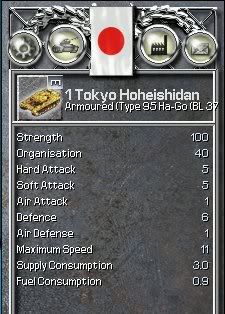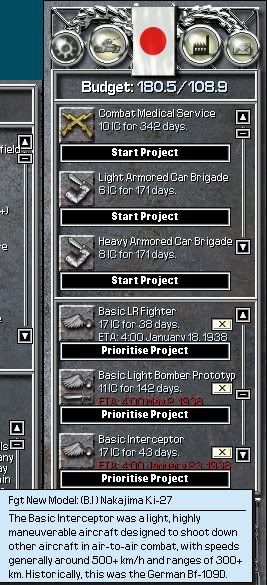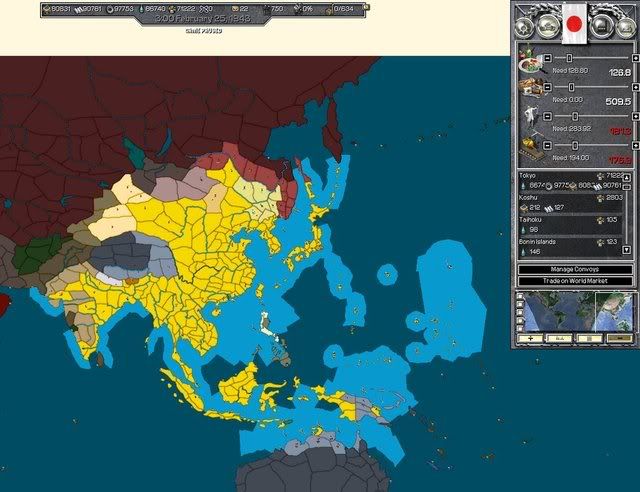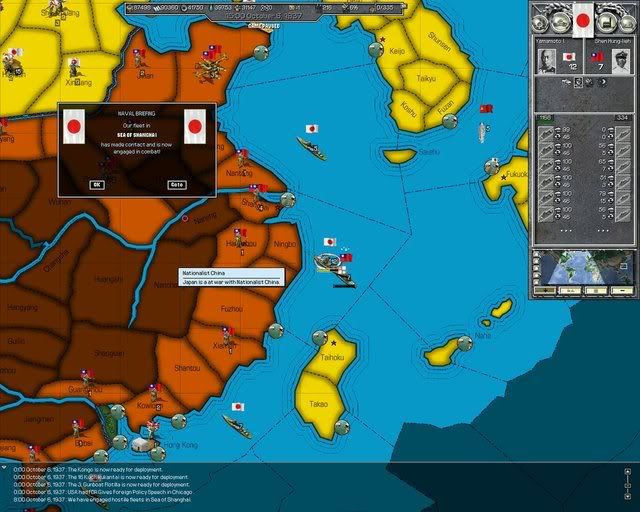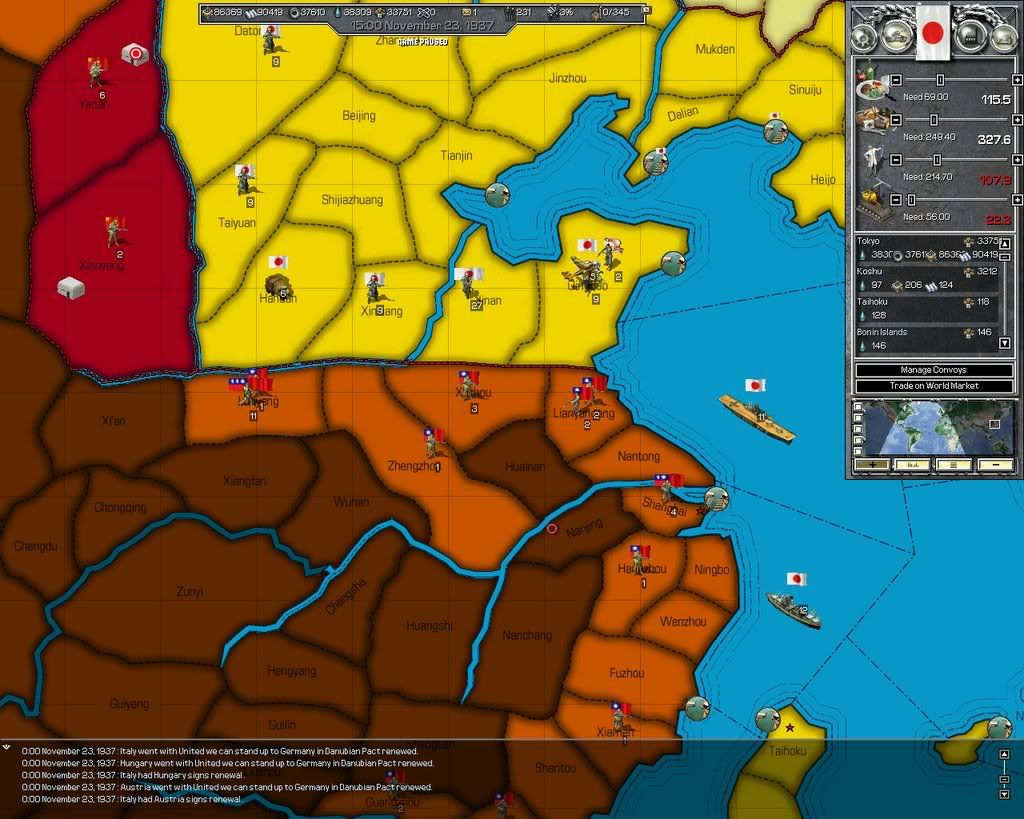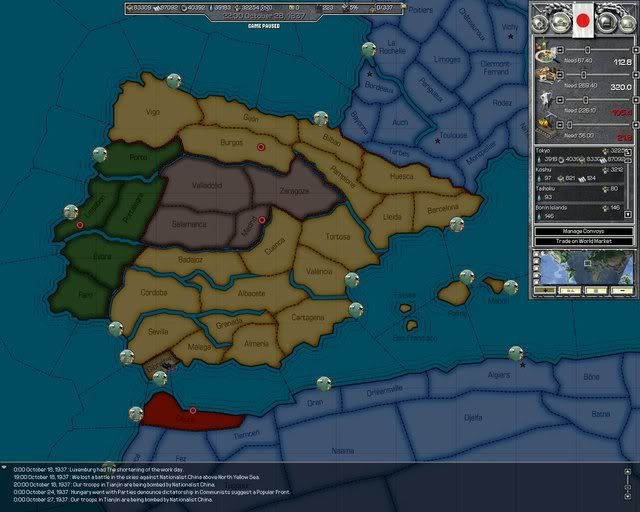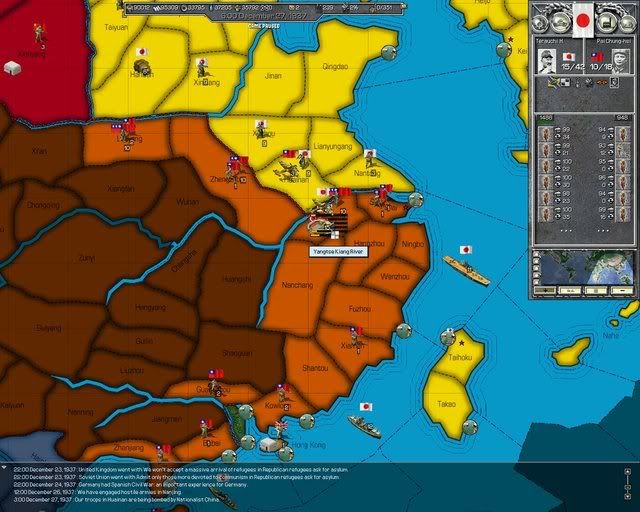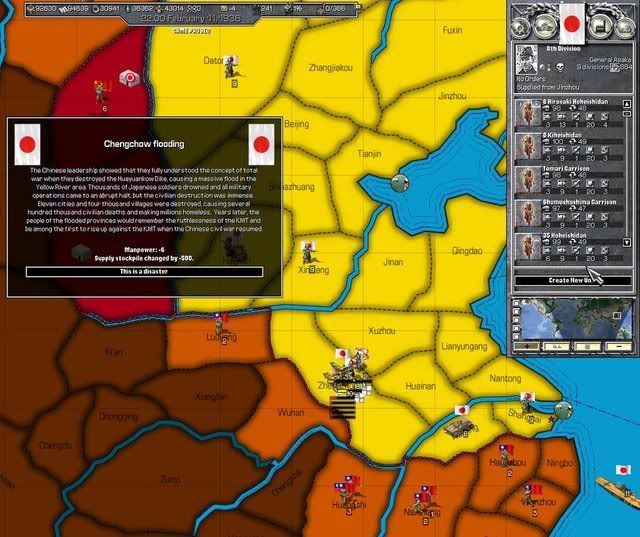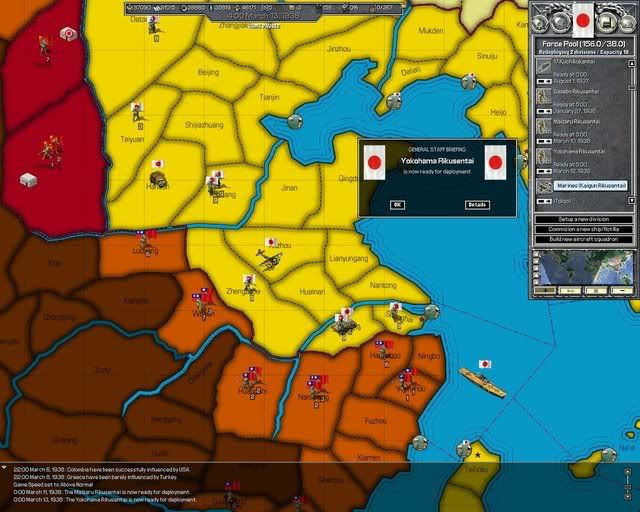Winter 1937-1938
As had been discussed by military theorists for eons past and no doubt for time yet to come, a general can be given the latest high-tech toys – armor and planes in this conflict’s instance – and still in order to conquer and pacify a region’s inhabitants, it would take manpower to accomplish this goal. In mid 1930s Japan’s military was amongst the smallest in the world, albeit they did have one of the largest navies around. Come late 1937 Japan’s embarking on a massive military program resulted in their having the third largest standing army in the world.
This however was misleading in that China only had to concern themselves with their contiguous territories. Japan had the beginnings of a far-flung empire and the aspirations for even more. As such even with all the men conscripted into their armies, barely two-thirds would be used in the Chinese mainland. There was the Russian juggernaut to concern themselves with to the north, island territories that needed some sort of presence, industries to retool, ships to man, and recently subjugated provinces needing garrisons. All this created a huge drain on the most important resource of all that Japan was lacking and could not effectively garner simply via conquests – manpower.
Madrid, Spain, 17th of December, 1937
Cheering crowds thronged the plaza square below the café where General Franco had established his headquarters these last few weeks after triumphantly taking the city…and with little bloodshed as well. Apparently he had tired of the bloodshed seen so prominently in the American papers of late. Smiling and waving to the crowd below his penthouse suite ne’ command center he waited as the lamplighters finished their job amongst the crowd. So much the better in the late night for all to see him now.
“My peoples, the war is finished! The Republicans have been defeated finally and accepted the inevitable outcome which we started two years ago! Changes will come in time, so swiftly your head may spin, but for now let us pick up our ploughshares, our rakes, and let us plant the seeds of a final peace! Together we shall make Spaniards proud of Spain!”
Waving once more to the crowd he disappeared into his room, allowed his aides to remove his military regalia and wearily settled into the comfortable chair by his desk. He would not cease working though as there was the matter of the piper to pay for his help in gaining victory. How to craft this letter to avoid offending arguably the most powerful man in Europe right now yet maintaining his distance from any entanglements…
130km into Nanjing province, 1400 hours 26th of December, 1937
The smell of cordite was strong in the cramped, confined quarters of Lieutenant’s Setai’s command tank as another shell was rammed into the gun’s breech following the ejection of the spent shell. Loaded yesterday morning with mostly High Explosive rounds, his crew was rapidly going through their supply. If this kept up for long he would be forced to start using their few Armor Piercing rounds he had. Emperor protect them if he had to dip into that reserve!
“Track right! Gunner, fire into that strand of trees!” Following his commands smoothly the next shell flew out of the tank’s cannon and impacted the desired spot within seconds. Dirt and body pieces flew up noticeably as yet another machine gun was silenced.
“Driver forward…keep the machine gun firing on that area” he stated. With a rumble of gears and a small belch of smoke his tank moved forward yet again toward their eventual goal, the city of Nanjing itself. Setai was glad to see his tanks allowed to participate in this important fight, especially considering the events over four months earlier where the armor units conducted themselves poorly. Now a chance to atone this black stain was provided to he and his men and they were taking advantage of this opportunity.
Bullets began to ping off his tank’s right hull and Lieutenant Setai gave quick orders, “Turret right, gunner locate that next machine gun!”
Yes…with the Emperor’s will all would be forgiven and revenge taken…
19th of January, 1938, Imperial General Headquarters
Aides and corpsmen scurried through the hallways of the busy headquarters as even in the cold, snowy winter there was much to report. The weather outside in Japan might be frightful but in China there was an unprecedented heat wave. Temperatures soared into the 70s and the sun shown more often then not. This was due to change but for now the field commanders were taking full advantage of this climate. Several aides would stop, salute the double cherry paneled doors and briefly enter, handing their new reports to the waiting staff inside. Around the large war table were several officers, advisors, and no less a personage than Admiral Yamamoto himself. As General Anami had been recalled to the Imperial Throne to explain both the Nanking Massacre and the American Panay incident to the Emperor personally, Yamamoto had led the last few briefings of late. Besides, with the successes on land there were fewer and fewer ports for the remnants of the Chinese navy to sortie from. Other than the Battle of Shanghai Sea there were in fact very few naval encounters aside from the random destroyer or gunboat sighting. As such, Yamamoto took a well-deserved break from leading his naval forces around China to tour the shipyards and plan for the future.
“Our training camps report that our first Marine divisions will be readied later this month with more coming in March. We believe we can have these new units assist our generals in attacking southern China from the sea. In addition, the new carrier Akagi should be starting sea trials by February 1st Admiral.”
Yamamoto nodded, “Yes, I saw earlier last month its construction. It should be the most advanced platform at sea, eclipsing anything the Americans or British have available. And I spoke with our technicians, they feel with the new A6M fighter coming out of prototype and into production, our new carriers should receive them.”
“Agreed Admiral”, nodded the advisor, “the Chinese have yet to mount a serious air campaign, mostly nuisance raids unlike our bomber squadrons. We are seeing handsome rewards each time they go into the air.”
Pointing to the map Yamamoto asked, “With Phase Three completed how are we progressing on Phase Four?”
“As the Admiral should note, we were beginning the flanking attacks around Shanghai province in preparation for the military actions. Our armor is performing superbly now, excesses in Nanjing not withstanding, and did not expect Shanghai to fall in a matter of hours. Our forces are pushing to the west and interior provinces and we should get final results in that area within a few weeks. The going is slow for our men as the region is fairly hilly and while the coastal provinces have enjoyed beautiful weather, the interior is seeing poorer climates. Rain mixed with snow is slowing everything down there.”
Yamamoto grunted, “There is little we can do about the weather unless our scientists are withholding something back? No…the field commanders must do the best they can for now.”
Excerpted from How the East was Won by Robert Kincaid
…events over a month ago in Nanking fresh in the minds of the demolition team tasked with the destruction of Huayuankow Dike they knew many innocent Chinese civilians and even their military brethren would be lost via their actions. However orders were orders and if a fair measure of revenge could be dished out in the same breath, so be it.
It would be the better part of a week before the flooding finally receded and even longer before the Japanese could partake in offensive operations again. Coupled with the worsening weather, the Japanese commanders discussed the situation amongst themselves and decided to simply reorganize and refit their troops, readying themselves for the spring. In the meantime, a little bit of political leaning forced Germany to cease their operations of helping train the Chinese in return for formal recognition of Manchukuo along with some yet, undeclared to the world specifics. This, in conjunction with improvements in the Japanese air force and speedier methods to build their naval forces up would allow the Japanese leaders to console themselves that all in all, the last few months were not all bad. However, the failure of field commanders to reign in their troops would induce dire consequences not felt for many years…
Interlude
From start of research project to finishing of the first three new specialized units for warfare, Marines of Japan would be making their mark on the world soon. Weeks would have to pass before they would be fully equipped and ready but they would be utilized in the coming months often and in many different roles from normal infantrymen.
A dozen and a half provinces lay under the Japanese control and they were readying themselves to continue the push next season when the weather would improve. As for the political climate, the war in Spain over with the world’s attention began to shift to Asia. What Japan would need was another distraction; fortunately for them they did not have long to wait thanks to the machinations of a particular man…
Note: Yamamoto should’ve stayed out at sea – January 22nd the Chinese navy sortied out one final time, thanks to the capture of Shanghai, and a second Battle for the Sea of Shanghai was fought. This one was quicker, lasting all of five hours and resulting in the remnants all being sunk (previous post above…my memory ain’t what it used to be!). The dastardly Chinese air force though was proving irascible and difficult to pin down. Often they would fly in, bomb for a few hours, then fly away. My best attempts to get my CAG involved would often lead to the CAG losing the fight. Fortunately for them seppuku is not an option…only eventual success. Though this stance might change years later…




